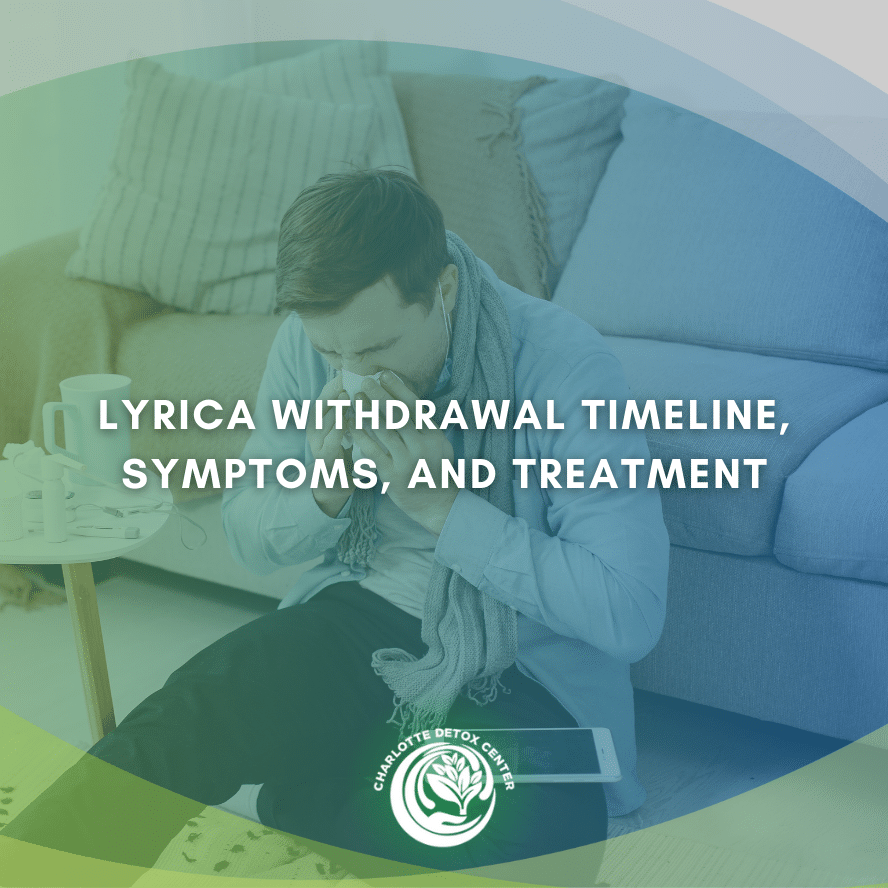Lyrica Withdrawal Timeline, Symptoms, and Treatment

Medically Verified: 2/1/24
Medical Reviewer
Chief Editor

All of the information on this page has been reviewed and verified by a certified addiction professional.
Many people assume that all prescription medications are always safe to use. But some prescription drugs, including Lyrica, can be addictive–and stopping using them can be very challenging.
When you use some drugs for a long period, your body develops tolerance to them, meaning it can’t function normally without the drug. If you suddenly stop using the drug, you will probably experience a range of uncomfortable withdrawal symptoms.
In many cases, Lyrica withdrawal is not dangerous. However, some people may develop significant, sometimes life-threatening complications. Even if you do not experience harmful side effects, Lyrica withdrawal symptoms can be so uncomfortable that you may relapse before completing detox.
So, how long does Lyrica withdrawal last? It’s impossible to predict exactly how long withdrawal will take because each person has unique recovery experiences, but many people follow a similar Lyrica withdrawal timeline.
Understanding the common symptoms of withdrawal may make it easier to get through detox and treatment. If you know what to expect, you can stay motivated and seek the treatment you need at each stage.
If you or a loved one require support to manage Lyrica withdrawal symptoms, or you want to learn more about starting a substance abuse treatment program, contact the team at Charlotte North Carolina Detox.
What is Lyrica (Pregabalin)?
Lyrica is a brand name for pregabalin, a prescription medication used to treat several medical conditions, including fibromyalgia, nerve pain, and epilepsy. From 2016 to 2020, about 51.4 million prescriptions for Lyrica were filled, making it one of the most commonly-prescribed pain medications in the United States.[1]
Lyrica works by slowing the brain’s activity, calming overactive neurons, and changing brain chemicals associated with pain signals. The medication reduces seizure activity and provides pain relief.[2]
Some of the common side effects of Lyrica include:
- Fatigue
- Poor balance and dizziness
- Tremor
- Blurred vision
- Weight gain
- Euphoria
People may misuse Lyrica because it causes some users to experience a desirable “high” or euphoric feeling. Misusing Lyrica can lead to dependence and addiction.
What are Common Lyrica Withdrawal Symptoms?
If someone becomes dependent on Lyrica by misusing the drug, they will likely experience withdrawal symptoms when they stop taking it. Typically, doctors recommend that people who abuse Lyrica taper off the drug slowly to reduce the severity of their withdrawal symptoms.
Some common Lyrica withdrawal symptoms include:[3]
- Headaches
- Agitation
- Depression
- Anxiety
- Confusion
- Suicidal thoughts
- Nausea
- Diarrhea
- Sweating
- Increased heart rate
- Insomnia
- Cravings
- Seizures
Some withdrawal symptoms–including suicidal thoughts and seizures– can sometimes become life-threatening. Going through withdrawal in a supervised drug detox program gives you the support and treatment necessary for a safe, complete detox.
How Long Does Lyrica Withdrawal Last?
It’s impossible to determine exactly how long your withdrawal symptoms may last because each person has unique factors that affect the length and severity of their symptoms. Generally, though, Lyrica withdrawal begins within a day or two of your last dose and can linger for several weeks.
The Lyrica Withdrawal Timeline
While each person has their own Lyrica withdrawal timeline and symptoms, many people discover their detox and withdrawal follow a similar timeline. Understanding what will likely come next can help you prepare for each stage and may motivate you to complete detox.
First 24 Hours: Lyrica has a 6-hour half-life, meaning symptoms are likely to begin within the first 24 hours of your last dose.
Days 1-2: Symptoms are likely to be the most intense during the first days after your last dose of Lyrica. Headache, tremors, sweating, nausea, insomnia, and confusion can be uncomfortable and exhausting. Many people experience intense cravings for the drug as their body adjusts to the sudden absence of Lyrica.
Day 3-4: Symptoms of withdrawal may peak on the third or fourth day of detox. Extreme fatigue, severe depression, stomach cramping and nausea, increased heart rate and blood pressure, and aggression are common. Some people experience psychosis or seizure during this period.
Week 2: After a week of intense symptoms, many people feel some improvement in their physical Lyrica withdrawal symptoms. Starting at the beginning of the second week, people may experience the following:
- Nightmares
- Anxiety
- Depression–sometimes with suicidal thoughts
- Fatigue
- Confusion or “cloudy” thinking
- Irritability
Strong cravings for Lyrica remain during the second week of withdrawal.
Week 3 and beyond: Physical symptoms resolve mostly or entirely during the third week, but psychological symptoms continue. Some people experience significant relief from these symptoms during the third week, while others struggle with them for weeks or months.
What Factors Affect Your Lyrica Withdrawal Timeline?
Several factors affect a person’s Lyrica withdrawal timeline and the severity of their symptoms. These include:
- How long they used Lyrica
- How much Lyrica they took
- Other drugs they were misusing at the same time
- Kidney function
- Age
- Body composition
Regardless of the length and severity of your symptoms, seeking professional treatment is important to avoid developing life-threatening complications or relapsing before detox is complete.
Get Help Now
If you or someone you love need help managing Lyrica withdrawal symptoms, don’t take chances with your health and safety. Reach out to the Charlotte North Carolina Detox specialists to explore your treatment options and learn more about managing withdrawal safely.
Don’t wait another day for the treatment and support you deserve. Call today.
References:
